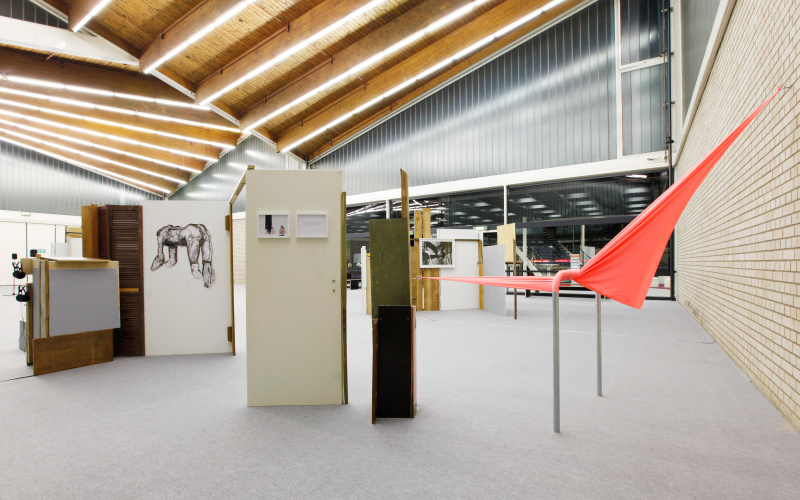- Event
- Opening
Free Choice?
The Art Life's Power of Form
Thu, November 12, 2009 7:00 pm CET
- Location
- Nancyhalle
The exhibition Freie Wahl? Die Formkräfte des Kunstlebens is an experiment and a statement. Women artists with close ties to Karlsruhe were invited to present their own artistic works and/or to elect as main focus, another person or position with whom collaboration would be possible. This elected individual does not have to come from Karlsruhe, does not have to be a living artist, and does not have to be a woman. The position(s) and exhibits that the artists chose were entirely open: important was simply, FREE choice. "Choice," or "vote" is not understood here as a criterion of the chosen artistic work, but rather, as a concrete application of rights. By bringing into play the possible form of taking action as a responsibility that is not for oneself alone, but also for (and with) someone else, this option becomes free space for new and incalculable relations and mutual references. In this way, a new, freer form of exhibiting and rethinking women's suffrage, the right to vote—which is celebrating its 90th anniversary in 2009—is thematized through an exhibition, reading, music, discussions, theater, and performance.
The politico-cultural writings of Marianne Weber (*1870 Oerlinghausen, †1954 Heidelberg), who, as one of the first women, was voted into the Karlsruhe Ständehaus in 1919, and was involved in the struggle for women's active voting rights, provided the impulse for looking at the interaction of legislation and culture, as well as the resulting ability to shape life. Shaping in the sense of action, in this regard, goes hand in hand with the active form of the state of a society, which is expressed in its subject as well as object. The title "Die Formkräfte des Kunstlebens" (borrowing from Weber's essay "Die Formkräfte des Geschlechtslebens" [The shaping power of the gender life] from 1918) includes this aspect of shaping, which—based on the example of the fine arts—finds expression in the exhibition Freie Wahl? Die Formkräfte des Kunstlebens. Subtly differentiated artistic formats will be asserted and made available, whereby the diversity of media—painting, sculpture, installation, design, photography, film, performance, music, and literature—reflects the polyphony of the presented, individual artistic works and ways of speaking. Aiming to direct a reversionary gaze at such issues, forms of action, and sites of cultural articulation that have moved women to artistic engagement over the past century, the Centre Georges Pompidou in Paris (as one of the world's first national cultural institutes), is exemplarily displaying from its collection, exclusively the positions of women artists, thus allowing a review from the beginning of the twentieth century until today.
The exhibition Freie Wahl? Die Formkräfte des Kunstlebens places a particular focus on women’s positions in society, which are highlighted from a cultural perspective and put up for revision and discussion based on the exhibits presented in Nancyhalle, and in the context of an extensive accompanying program of events. With "Bakchen," the Badische Staatstheater has chosen an ancient piece, and at the same time, one shown in conjunction with the exhibition, which in the theater staging of Raoul Schrott’s reinterpretation of the Greek tragedy by Euripides, embodies an up-dated radicalness of the "Formkräfte des Geschlechtslebens."
We would like to extend our special thanks for their willingness to accept our invitation to the exhibition (the first vote), to enter into a cooperation as a consequence, or invite another position (the second vote), and thereby enter into the experiment: BLESS (Desiree Heiss/Ines Kaag) and José Rojas, who developed a workshop together for this project; Patrycja German and Stefanie Trojan, who carried out a role-exchange on their artistic-performative work; Anna Lea Hucht, who selected a film by the recently deceased director Hiroshi Teshigahara in conjunction with her position; Anna Jermolaewa and Annabel Lange, who created new visual and interpersonal communication spaces in the context of this exhibition; Anna Kolodziejska, who read lyrics from the Polish Nobel Peace Prize recipient Wisława Szymborska; Sandra Meisel and the artists' collective "Der Strich" (who also provided the concept of this project) as well as their invited guests; Marijke van Warmerdam and Jessica Stockholder, who had no personal contact before Warmerdam’s selection, and whose artistic works experienced their first convergence; and, finally, Corinne Wasmuht and the “Universal Cosmopolitan Research Project” (Rahel Flink, Vytautas Jurevicius, Ani Schulze, and Johanna Wagner), which showed the possibility to break through the hierarchy of teachers and students, with all presenting their own artistic work together in an exhibition.
We likewise owe our thanks to all of the project participants—including musicians Viviane de Farias, Karl Frierson, Julietta, Marbert Rocel, and Anja Schneider—and especially, the Kulturbüro der Stadt Karlsruhe, who have stirred the versatile powers of form to new life.
We are looking forward to eight exciting weeks in Nancyhalle and extend a warm invitation for you to join us!
